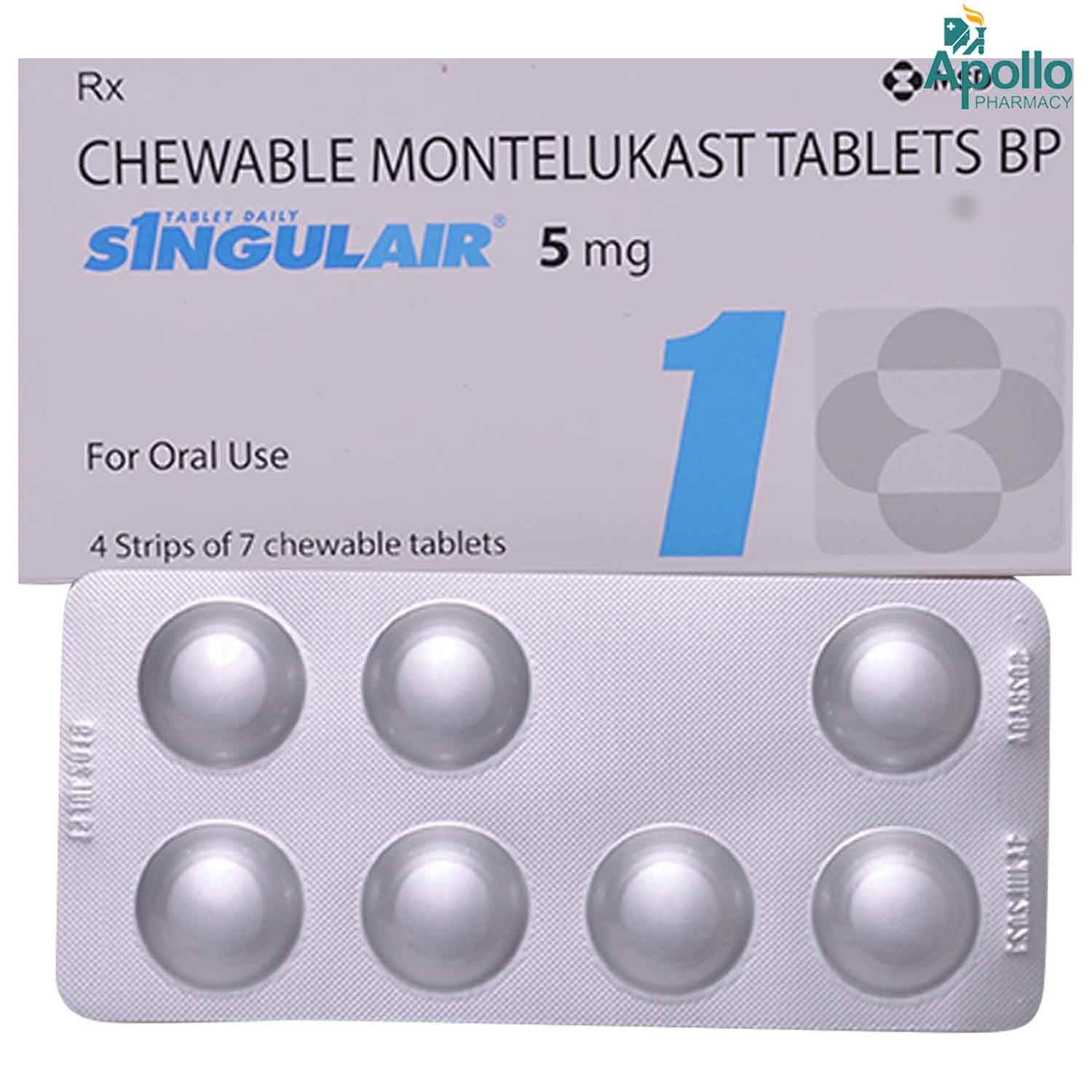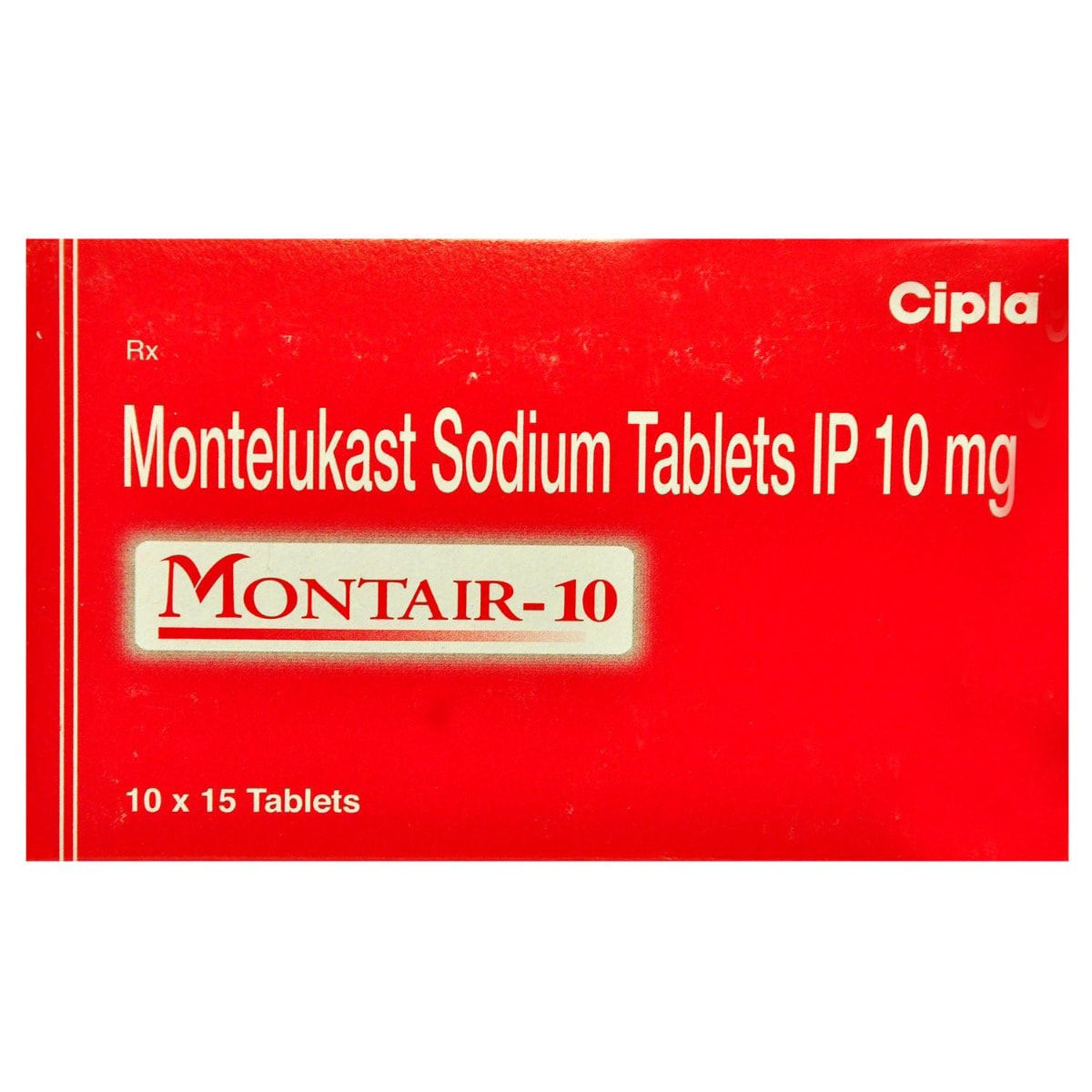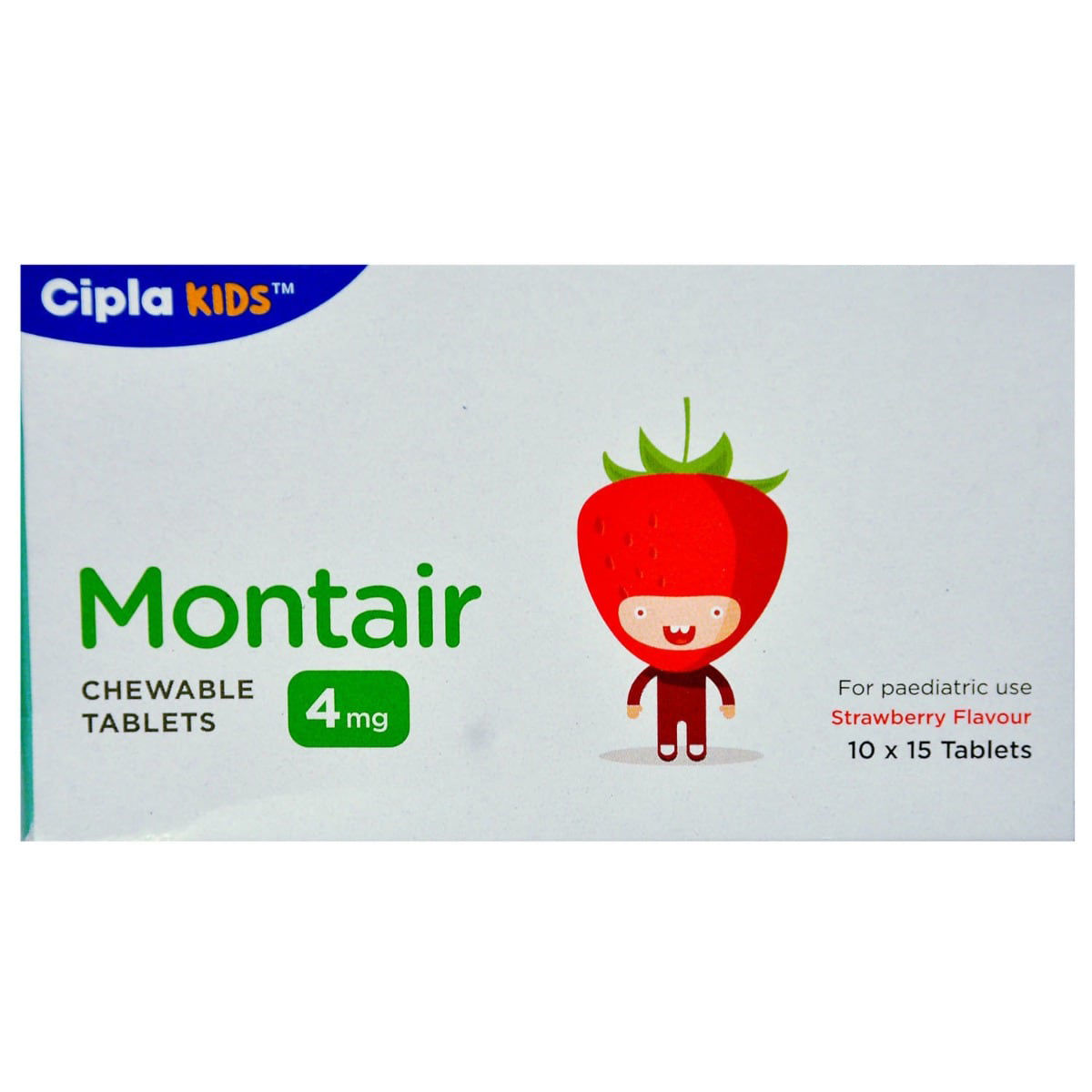Montelukast
About Montelukast
Montelukast contains an anti-allergic medication primarily used to treat seasonal allergies and asthma. An allergy is an immune system response to foreign elements, known as allergens, typically not harmful to your body. Asthma is a local inflammatory disease of the lungs & airways associated with exaggerated airway narrowing and may produce extra mucus due to specific triggers like viruses, allergens & exercise.
Montelukast contains a leukotriene antagonist, Montelukast. It works by blocking a chemical messenger (leukotriene) and reduces inflammation and swelling of airways in the lungs. This makes breathing easier and prevents asthma attacks. Leukotrienes are also released in your body when you have an allergic reaction to something like dust or pollen. Montelukast helps to reduce the level of leukotrienes and stops you from getting symptoms.
Take Montelukast as prescribed by your doctor. You are advised to take Montelukast for as long as your doctor has prescribed it for you, depending upon your medical condition. It can be taken with or without food. In some cases, you may experience certain common side effects, such as diarrhoea, headache, abdominal cramps, flu-like symptoms, nausea, dizziness, and vomiting. Most of these side effects do not require medical attention and will resolve gradually over time. However, you are advised to talk to your doctor if you experience these side effects persistently.
Before starting Montelukast, inform your doctor if you have severe liver problems. Concurrent use of Montelukast with alcohol or other antidepressants should be avoided as they may reduce your mental alertness. Even if you are asymptomatic and feel good, do not stop taking Montelukast, as stopping suddenly may lead to an acute attack of Asthma. If you have any mental disorder, inform your doctor before starting Montelukast as Montelukast can cause mood changes (symptoms include anxiety, aggressive behaviour, irritability, and restlessness). Sometimes, you might feel depressed. Inform your doctor if you feel any of these symptoms.
Uses of Montelukast
Medicinal Benefits
Montelukast is an anti-allergic medication that contains Montelukast. Montelukast is a leukotriene antagonist, which blocks a chemical messenger (leukotriene) and reduces inflammation and swelling in the nose and lungs, making it easy to breathe and help them to improve symptoms and treat a broad range of allergic conditions, thereby minimizing symptoms like sneezing, runny nose, coughing, watery eyes, etc. It is known as a preventer medication, which helps to prevent symptoms of asthma and allergies.
Directions for Use
Storage
Side Effects of Montelukast
- Diarrhoea
- Dizziness
- Headache
- Abdominal cramp
- Flu-like symptoms
- Nausea
- Vomiting
Drug Warnings
Do not take Montelukast if you are allergic to Montelukast or any of its ingredients. If you have any mental disorder, inform your doctor before starting Montelukast as Montelukast can cause mood changes (symptoms include anxiety, aggressive behaviour, irritability, restlessness). Sometimes you might feel depressed. Inform your doctor if you feel any of these symptoms. It is advised to avoid contact with known allergens (allergy-causing agents) such as pollen, dust, etc. Certain food items are known to cause allergies. Concurrent use of Montelukast with alcohol or other antidepressants should be avoided to reduce your mental alertness. Even if you are asymptomatic and feel good, do not stop taking Montelukast as it stopping abruptly may lead to an acute attack of asthma.
Drug Interactions
Drug-Drug Interactions: Montelukast may have an interaction with pain killers (ibuprofen, naproxen, diclofenac), blood thinners (aspirin), antiallergic medications (cetirizine), antiasthma drugs (salmeterol, albuterol, formoterol), anti-hypertensive medication (metoprolol), and anti-epilepsy medications (phenobarbital, phenytoin).
Drug-Food Interactions: Montelukast may interact with a multi-mineral or other herbal/ayurvedic supplements, St. John's wort plant (used for depression). So, if you are using any of the OTC items, please tell your doctor.
Drug-Disease Interactions: Patients affected with liver/kidney disease, epilepsy, and phenylketonuria should not take Montelukast as it has severe interaction.
Drug-Drug Interactions Checker List:
Safety Advice

Alcohol
unsafeAvoid drinking alcohol while taking Montelukast as it can worsen your side effects like drowsiness.

Pregnancy
cautionThere is limited data on how Montelukast affects pregnancy. Please consult your doctor if you are planning to conceive or already pregnant before starting Montelukast.

Breast Feeding
cautionThere is limited data on how Montelukast affects breastfeeding. However, Montelukast may pass into breast milk. Please consult your doctor before starting Montelukast.

Driving
cautionDo not drive or operate machinery if you experience drowsiness or difficulty in concentrating while using Montelukast. Montelukast may affect your ability to drive. Seek medical attention if the symptoms persist longer.

Liver
cautionMontelukast should be used with caution in patients with liver diseases. Let your doctor know if you have any history of liver diseases. Your doctor will weigh the benefits and potential risks before prescribing Montelukast.

Kidney
cautionMontelukast should be used with caution in patients with kidney diseases. Let your doctor know if you have any history of kidney diseases. Your doctor will weigh the benefits and potential risks before prescribing Montelukast.

Children
cautionMontelukast is not recommended for use for children less than two years of age. The dose may have to be adjusted by your doctor depending upon the condition of the child's disease and age.
Habit Forming
Diet & Lifestyle Advise
Some anti-inflammatory compounds in ginger can relax membranes in the airways, which could reduce coughing.
The immune system is affected by stress and raises the risk of being sick. An individual can exercise regularly, meditate, do deep breathing and try progressive muscle relaxation techniques to relieve stress.
To stay fit and safe, try to sleep 7-9 hours each night.
It is advised to avoid contact with known allergens (allergy-causing agents) such as pollen, dust, etc. Certain food items are known to cause allergies to you.
Maintain personal hygiene and keep your surroundings clean.
Special Advise
Staying hydrated is vital for those with a cough or cold. Drinking liquids at room temperature can alleviate cough, runny nose, and sneezing.
If you have phenylketonuria ( an inborn error of metabolism that results in decreased metabolism of the amino acid phenylalanine), you should know that chewable tablets contain aspartame, which is not recommended in such conditions.
Patients Concern
Disease/Condition Glossary
Asthma: It is a local inflammatory disease of the lungs & airways associated with exaggerated airway narrowing to certain triggers like viruses, allergens & exercise. Asthma leads to frequent wheezing, breathlessness, tightness of the chest and coughing episodes that differ over time in severity. Asthmatic attacks and narrowing of airway passages are brought about by the production & secretion of certain chemicals inside the lungs called leukotrienes. This condition is characterized by wheezing, breathlessness, chest tightness & cough with or without sputum.
Allergy: It is an immune system response to foreign elements typically not harmful to your body. These foreign elements are known as ‘allergens’ Allergic condition varies from person to person. Some might be allergic to certain foods and seasonal allergies like hay fever. While others might be allergic to pollen or pet dander. One of the symptoms of allergy is cough. Coughing occurs as a reflex action in the throat when there is mucus or any other foreign irritant in it.
FAQs
Montelukast is used to treat seasonal allergies and asthma.
Montelukast contains a leukotriene antagonist Montelukast. It works by blocking a chemical messenger (leukotriene) and reduces inflammation and swelling in the nose and lungs. And hence improving symptoms and relieve allergic symptoms.
Although it is very uncommon, Montelukast can cause mood changes (symptoms include anxiety, aggressive behavior, irritability, restlessness). Sometimes you might feel depressed. Inform your doctor if you feel any of these symptoms.
Montelukast can be safely taken as long as your doctor has prescribed it to you. However, please do not discontinue it or exceed the duration without consulting your physician.
Usually, Montelukast does not cause drowsiness, but in a few cases, drowsiness and sleepiness have been reported; hence, it is best to take it in the evening or at bedtime.
Therapy with leukotriene receptor antagonists like Montelukast may worsen the symptoms of psychotic events in patients with a history of mental illness. Careful administration and monitoring are essential before taking Montelukast in patients with neuropsychiatric disorders. Please consult your doctor before taking Montelukast if you have been diagnosed or have a history of mental illness like depression, seizures (fits), etc.
Montelukast does not contain a steroid.
Montelukast makes you drowsy or dizzy in some instances.
Do not use Montelukast to treat an asthma attack. Always use your reliever inhaler. Seek medical attention if you have any concerns.
Montelukast controls the symptoms of allergic rhinitis but does not cure these conditions. Continue to take montelukast even if you feel well. Do not stop taking montelukast without talking to your doctor.
Avoid drinking alcohol while taking Montelukast as it can worsen your side effects like drowsiness.
Yes, Montelukast may cause nightmares or weird dreams.
While specific dosing instructions will vary depending on your needs and medical history. Always follow your doctor's prescribed dosage and timing for taking these medications.
Individual needs may vary from person to person, so it should be used as directed by the physician. Your doctor may adjust the dose depending on the child's disease and age.
Montelukast may cause changes in the vision, so one should avoid driving or operating any machine that requires mental alertness.
Montelukast contains Montelukast, a leukotriene antagonist.
Common side effects of Montelukast may include diarrhoea, headache, abdominal cramps, flu-like symptoms, nausea, dizziness, and vomiting. Most of these side effects do not require medical attention and will resolve gradually over time. However, you are advised to talk to your doctor if you experience these side effects persistently.








